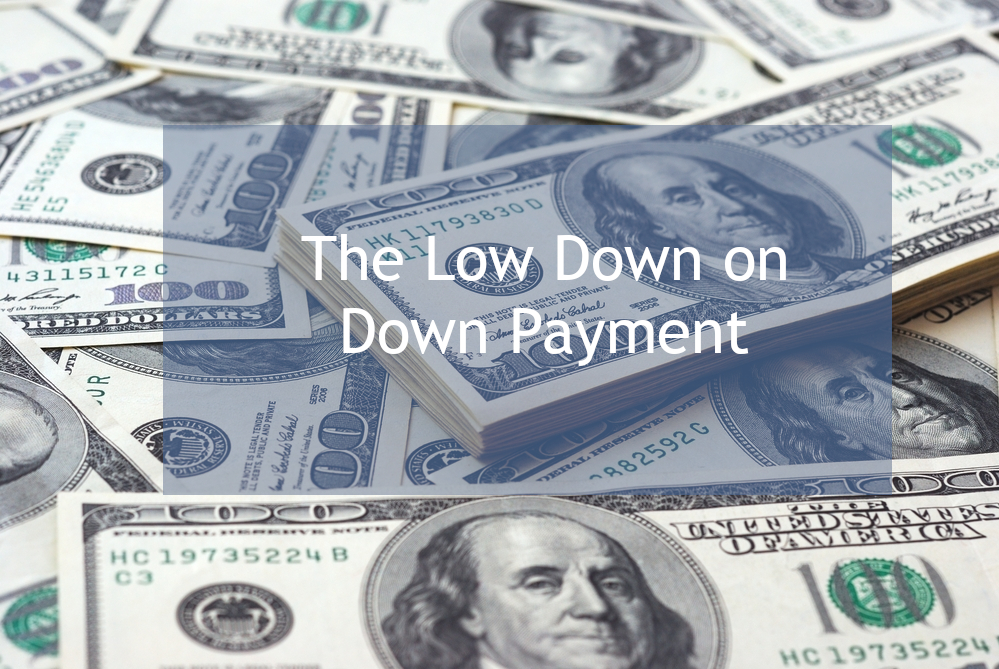
One of the most common challenges for first time home buyers is saving up for the down payment. This is in part due to misconceptions about the amount and source of down payment monies, and partly due to the challenges to saving while paying off student loans and getting started in careers, relationships and life in general. In this post I will dispel some myths regarding down payments, and provide useful tips to help first time home buyers identify solutions to the down payment challenge and enter the housing market.
Q1 How much do I need for a down payment?
The common misconception is that a buyer needs at least 20% of the purchase price for a down payment. For a $500,000 house that would amount to a $100,000 down payment.
While it is true that the more you put down, the less you will pay in interest, there are a number of mortgage programs that require far less than 20%. Even some conventional mortgages can be obtained for as little as 3% down, or about $30,000 for that $500,000 home.
Putting less than 20% down can result in both higher interest rates and fees, particularly Private Mortgage Insurance (PMI). However, many borrowers will refinance once they have built up 20% equity in their home, in order to lower their interest and eliminate PMI. PMI can also be waived once you reach 20% equity.
Q2 What types of mortgage allow less than 20% down?
As mentioned above, some banks will offer a conventional mortgage for less than 20% down. Factors that affect the down payment include an excellent credit score, the ratio of the mortgage payment to your income (called debt-to-income ratio), the amount of the loan and the type of property being purchased (single vs multi-family). In general, conventional mortgages have lower fees and are more positively received by sellers. Other types of mortgages may require certain conditions like peeling paint be remedied prior to closing. So what are these other types of mortgages?
FHA Mortgages – these mortgages require as little as 3% down payment (with a solid credit score), and can also offer mortgages with lower credit scores but higher down payment. PMI, however, is paid for the life of the loan in an FHA mortgage. FHA mortgages are popular with first time home buyers, but less so for sellers who may have to make repairs in order to close. FHA mortgages also require the home to appraise for the contract price, which can be an issue in a market where homes are selling above asking price.
VA Mortgages – these mortgages are available to Veterans and active duty servicemembers and surviving spouses and require no down payment, or PMI. Like FHA mortgages, they do require the home to appraise for contract price. There is also a funding fee of up to 3% (waived for certain veterans and survivors). Like FHA mortgages, the VA appraisal process may require repairs, and so can be unpopular with sellers.
USDA Mortgage – the US Department of Agriculture also offers mortgages in rural areas of the country. You might not think of New Jersey as rural, but areas of North Jersey generally west of I287 and north of US202 qualify for USDA mortgages. These mortgages, like VA mortgages, require no down payment and offer below market interest rates. There are income limits and mortgage insurance (called a Guarantee Fee) must be paid, however it can be paid up front. Currently the Guarantee Fee is 1% of the mortgage. If you qualify, and are buying in a qualifying area, a USDA mortgage could be very attractive.
Q3 What other programs are available for first time home buyers?
Each state (except Hawaii) has a program to assist first time home buyers with down payments. In New Jersey the NJHMFA Down Payment Assistance Program provides an interest free loan of $10,000 that is converted after 5 years to a grant, provided the buyer is still in the home. For the purposes of this program, a first time home buyer is defined as anyone who has not owned a home in three years, regardless of whether they owned a home prior to that. The program is available through participating lenders, and has income requirements. The main drawback is that it can lengthen the closing period, making it unattractive to sellers looking for a quick close.
Q4 What sources of money can I use for a down payment?
One question often asked is “can my family help me pay the down payment?” The quick answer is yes. But as with most things, there are limits and complications. In general there are three sources for down payment monies:
Personal Savings/Investments – this is the traditional source of down payment monies, your savings account, CDs, and sale of stocks, bonds or other investments. You will need to keep records of your accounts and sales to demonstrate to the lender the source of this money.
Gifts – whether from your (or your significant other’s) parents, friends, godparents or neighbors, you can use gift money for a down payment, however your giver will also have to provide documentation to the lender of the source of the money and demonstrate they have the financial stability to make the gift.
Your Retirement Savings – You can also withdraw or borrow money from an IRA, 401K or other retirement account for a down payment, however depending on the source taxes and/or penalties may apply.
For first time home buyers, down payment can be a challenge, but there are resources to help you achieve your dream of a home of your own. If you think you are ready, call or text me at 973-462-4079 and I’ll be happy to help you determine if you have the resources to purchase a home!


 Facebook
Facebook
 X
X
 Pinterest
Pinterest
 Copy Link
Copy Link


